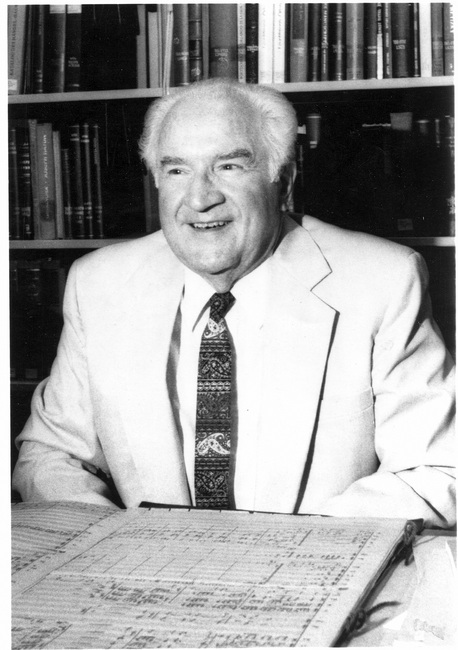

As a winner of the Pulitzer Prize, composer Robert Ward is a member of a rather exclusive club. Since 1943, the prize for music has been awarded most years, and in opera circles, Ward is one of the best-known of the recipients, having won in 1962 for a work which is often done and has been recorded, The Crucible.
There is, however, much more to the life of Robert Ward. His catalogue includes several symphonies and quite a bit of chamber music, some of which is currently available on CD. Besides composing, he's also held teaching and administrative positions, as well as being a music-publisher.
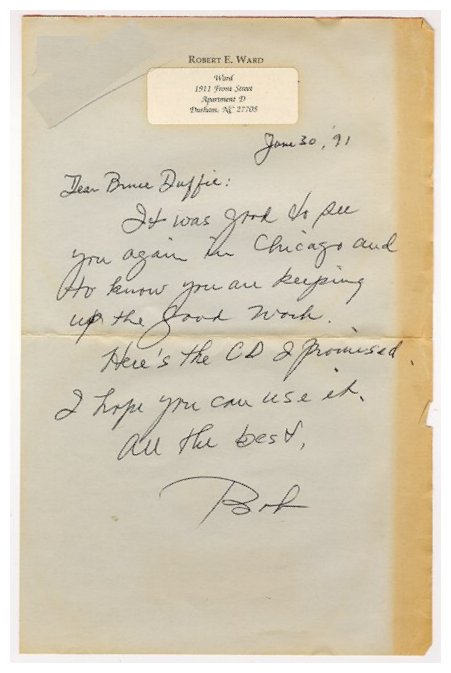 We first met and had an interview in June of 1985, when this same work was
being done by the Chicago
Opera Theater. [To read that interview, click here.] We
stayed in touch by letter [an example is
shown at left] and phone, and he has complimented me on this series
of Conversation Pieces in The Opera Journal! So, when he returned to
Chicago in February of Y2K for the production by the Northwestern University
Opera Theater, we decided to sit down and chat again. Here is much
of what we discussed that afternoon...........
We first met and had an interview in June of 1985, when this same work was
being done by the Chicago
Opera Theater. [To read that interview, click here.] We
stayed in touch by letter [an example is
shown at left] and phone, and he has complimented me on this series
of Conversation Pieces in The Opera Journal! So, when he returned to
Chicago in February of Y2K for the production by the Northwestern University
Opera Theater, we decided to sit down and chat again. Here is much
of what we discussed that afternoon...........
Bruce Duffie: Are you getting to the point you would rather people do operas other than The Crucible.
Robert Ward: Yes, as a matter of fact. I'm happy when they do The Crucible, but at this point I would like to have the others coming up with some sort of regularity. One would think that after a company had done one opera and had a great success, that they would immediately think about other operas by the same composer. But this has been a funny time for that.
BD: How so?
RW: When my first two operas were written, there weren't many American operas around, so the people did look at them. Then Opera America started its big program of commissioning. That came at the same time when there were so many new opera companies springing up all over the place and they had to do the standard repertoire which were all new operas to their communities.
BD: When was this?
RW: This would have been 1947 to ‘48. Up to that time, almost the only place that you could get a new American opera produced was at the Columbia University Opera Workshop. No one else was doing anything. Then the Ford Foundation gave the big grant to the New York City Opera and in two years they did about 14 of the existing operas.
BD: That would be about half the repertoire, I guess...
RW: That's right. (Both laugh) Then about 10-12 years later, Opera America started its big program of commissioning operas. They wanted to have very contemporary ideas, things on the cutting edge and so forth. They had all sorts of terminology for it.
BD: Was it part of the commission to be on the cutting edge, to do something contemporary?
RW: Oh yes. The projects that were funded – and they had some rather handsome funding at that time - were those things. They felt that they shouldn't be what they thought was the standard opera. And those commissions were very important to the companies because they needed funding for production and that was part of the whole project. So instead of looking at the repertory that was there, everyone went out to do new operas because they could get money for their budgets, and one of the results was that they didn't pay much attention to the existing works. So, though The Crucible kept going through all this, the new operas all got good productions. But once they were produced, people were looking for other works to commission. Three years ago, Opera America turned their policy around and made it specifically to look back at the repertoire. This is because very few of the operas that they had commissioned during that 15 year period had ever gotten second performances, and they were disturbed by that. So they changed the policy to encourage a re-examination of the repertoire that was there.
BD: So the companies go back to successes.
RW: That's right. I think the situation will gradually change, particularly now they've had to call a moratorium on that program because funding has been so hard to get.
BD: But in the general history of opera, there are only a few that have made it into the standard repertoire. Most operas are done once or twice and then disappear.
RW: That's right. That's right. The shelves in the library are littered with works and not all of them are by unknown composers. It's not a new thing in the history of opera, by any means.
BD: So now you're trying, as best you can, to get some of your other works produced?
RW: Yes. I've been sending around a booklet I made up which has the synopsis of all the other 6 operas and 2 CDs of excerpts from performances which I've had which are good ones, and all the information in the hopes that this will interest people. I think it will. I knew what the situation was, so I checked this out with some opera directors before embarking on it. When I spoke to director of New York City Opera, he said, "This will be wonderful," and he pointed to a closet. "That closet is piled to the ceiling with scores and tapes which I've received, and I just can't find the time to take 2 or 3 hours to listen to these works and make any kind of decision." So he was very happy with my idea. We'll see...
BD: Tell me a bit about these other 6 operas, are they all full-length, or are some one-act works?
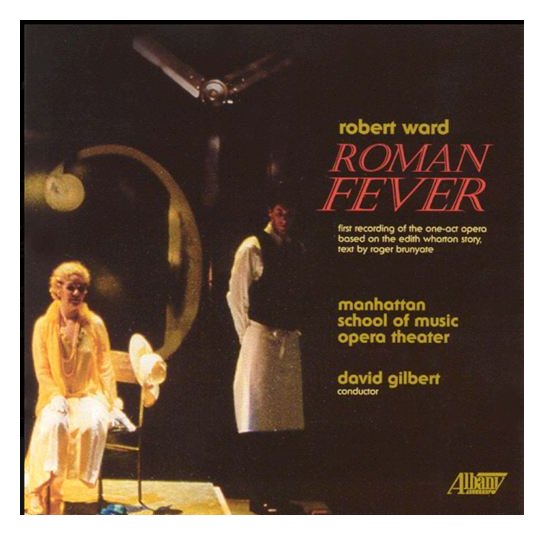 RW: The last one I did was a one-acter, called Roman Fever. The others are full
length. They were commissioned as full-length operas. Roman Fever, the last one, came out of
a sort of interesting circumstance. When The Crucible was done here fifteen years
ago by the Chicago Opera Theater, the director was Roger Brunyate who is
head of the opera department at Peabody Conservatory. We were sitting
around after rehearsal and he told me that he was trying to encourage all
of his composer and librettist friends to write scenes, short operas, full
length operas, that had predominantly female casts because in the conservatories
and the universities, they've got all the good well-trained young women they
can use, but the standard repertoire has predominantly male casts with a few
women. I thought that was a very sprightly idea and when I got back,
I just happened to pick up this volume of short stories of Edith Wharton.
There was one called Roman Fever
which is a little 11-page story, but it hit me immediately. As it's
written, it's a story about two 40-year-old widows who had known each other
some 20 years ago in Rome, and at the time the one was engaged and her fiancé
was there. Then they both had come back, married, and had daughters
who were about 20. This all took place in the 1920s, so these were
young flappers. You read about them in the story, but they really aren't
on stage. Well, immediately he said, "Boy, we're going to put them
on stage. That'd be fun." So we added them to the cast and then
I insisted that we had to have a male voice to break it up along the way
somewhere. So we made a typical Italian waiter who sings an aria right
in the middle of it. So that's been done, as a matter of fact, quite
a bit. It's good for schools.
RW: The last one I did was a one-acter, called Roman Fever. The others are full
length. They were commissioned as full-length operas. Roman Fever, the last one, came out of
a sort of interesting circumstance. When The Crucible was done here fifteen years
ago by the Chicago Opera Theater, the director was Roger Brunyate who is
head of the opera department at Peabody Conservatory. We were sitting
around after rehearsal and he told me that he was trying to encourage all
of his composer and librettist friends to write scenes, short operas, full
length operas, that had predominantly female casts because in the conservatories
and the universities, they've got all the good well-trained young women they
can use, but the standard repertoire has predominantly male casts with a few
women. I thought that was a very sprightly idea and when I got back,
I just happened to pick up this volume of short stories of Edith Wharton.
There was one called Roman Fever
which is a little 11-page story, but it hit me immediately. As it's
written, it's a story about two 40-year-old widows who had known each other
some 20 years ago in Rome, and at the time the one was engaged and her fiancé
was there. Then they both had come back, married, and had daughters
who were about 20. This all took place in the 1920s, so these were
young flappers. You read about them in the story, but they really aren't
on stage. Well, immediately he said, "Boy, we're going to put them
on stage. That'd be fun." So we added them to the cast and then
I insisted that we had to have a male voice to break it up along the way
somewhere. So we made a typical Italian waiter who sings an aria right
in the middle of it. So that's been done, as a matter of fact, quite
a bit. It's good for schools.
BD: What is the performing time?
RW: Just an hour. But, you know, the big opera companies are not enthusiastic about one-acters because they have twice the work for the one audience and they usually have to hire different casts and so forth. But this is something that conservatories can do very well.
BD: Are you pleased with this, or would you rather they be done by a professional opera company?
RW: In the case of all of the operas except for our first one, which in fact, it was done by Columbia University workshop (which drew on singers from all over New York), all of them have been commissioned by professional opera companies.
BD: Does that change the shape of the line or the ideas when you get a professional company commissioning the work?
RW: Actually, not much. It's the story itself which controls the kind of music you write. In the case of The Crucible for New York City Opera, I knew most of the cast we were going to be using for it, so I knew those voices. But in many of the others, I didn't know the singers in advance. I would write a role for a good baritone or for a comprimario or whatever.
BD: Now this brings up an interesting question. From the eyes and the ears of the composer, what is it that makes a good baritone or a good comprimario?
RW: I think one has
to qualify it by saying "good for a role." In fact, in a class that
I did at the University today, I was asked, "How did I choose the voice for
a given role?" I had to admit that I always felt that baritones were somehow
more noble than tenors. Furthermore, often the tenor will be a little
guy and the soprano is towering over him, so that colors it somewhat.
But actually, it is the nature of the role which you're looking for.
In The Crucible, Judge Danforth has
to be a kind of cold, nasty guy, so you don't look for a beautiful voice.
You look for a person with a strong voice who's a fine actor. On the
other hand, Mary Warren has to have a very flexible upper register because
I've written a lot of coloratura for her. And you want someone that's
small and dramatically can be a kind of reed in the wind. She goes any
way. She's got kind of no mind of her own. So you look for not
only that kind of voice, but that kind of looking-girl. It doesn't always
work out that way. In the libretto I describe the kind of character
she is and I got to the first rehearsal and saw that the singer was a lush
looking young gal. God, she was a little beauty, and I wondered how
is she going to look drab. But she was a wonderful actress and they
made her up appropriately, so she did fine.
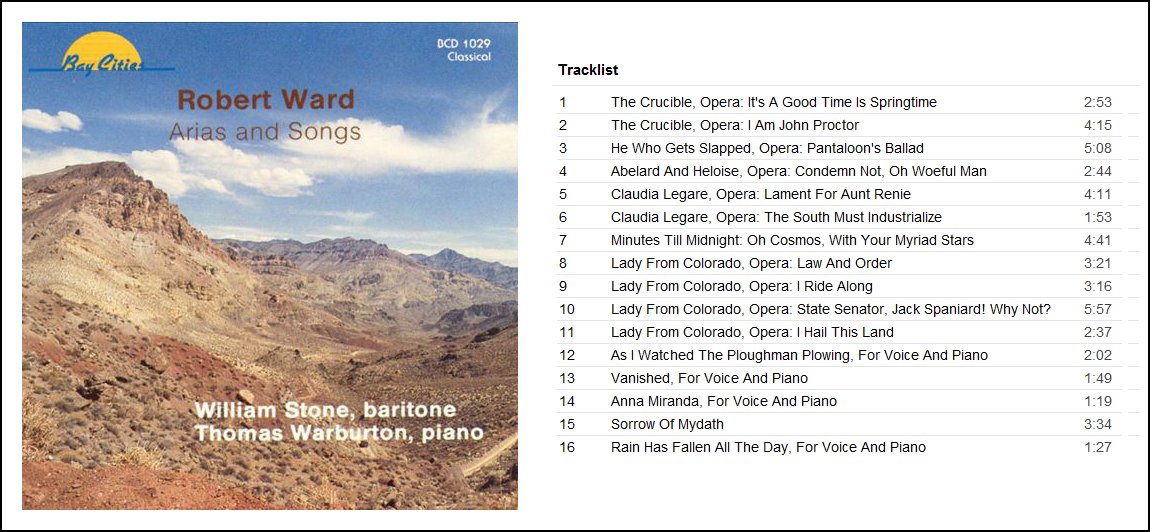
See my interview with William Stone
BD: Is finding the right libretto even a harder job
than writing the music?
RW: Yes. It all comes out of the libretto, but when you write the music, you try to write it appropriately. That is the key thing. People don't go back 30 times to Bohème to learn about the story anymore!
BD: When you're sitting at your desk and you're found a good libretto or excellent libretto, is it daunting to know that you've got to come up to that level with your music?
RW: Sure. I remember the first time I saw The Crucible as a play. It just wiped me out. It was so moving, so powerful, and I thought many times along the way that this music has to be at least that powerful in its own way, even add to it. It puts you on your metal.
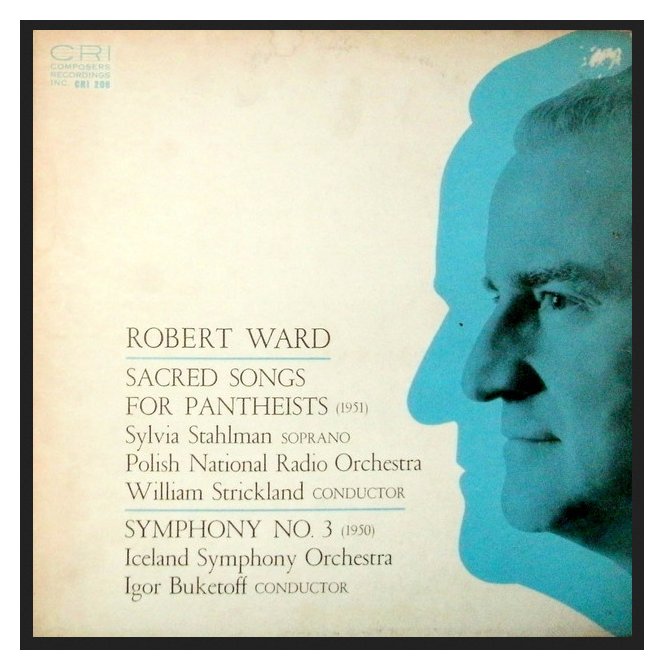 BD: The public has deemed that it has been successful.
BD: The public has deemed that it has been successful.
RW: I think so. Yes.
BD: Do you think it's been successful?
RW: Yes. Curiously enough, it is not been done by the Met or the Lyric or Covent Garden. It would be nice if it were. On the other hand, it is an opera which is condensed enough and there's so much in it which is more intimate, that it's not as good in the big, big houses.
BD: Have you ever thought of using a libretto which actually incorporates the audience into part of the drama?
RW: None of the operas, but another piece that I've written which is called The Images of God is actually a Protestant service for the church. It takes one hour. The Chapel on Duke University campus is gorgeous, with fine organs and a fine choir. They wanted me to write a work, and prior to that, my wife and I had made a trip to Israel and we went to one of the cities just north of Jerusalem where there's a modern Catholic church which has been built. Catholic congregations from all over the world sent them either mosaics or stained glass windows, and we went in there and the first thing that struck me was that whether it was a mosaic or whether is was a stained glass window, if it came from an Asiatic country, God had slanted eyes. He looked Oriental. If it came from Africa and it was a black community, God was black. I thought God made man in his image and obviously, man has made God in his image. So that sort of started me thinking. As the work turned out, there are several sections with readings about God as Moses saw him (the stern, harsh father-figure), God as David saw him (the pal who forgave him), God as Christ saw him (the father/son relationship), and finally God as Noah saw him. We had the voice of God from the top of the Chapel singing "Persist Noah. Persist." It's a piece that I'd love to get combined with Roman Fever. It could be done by an opera company that had a chorus. They don't even have to memorize the choruses because they're a choir. They can sing it right out, and they can be the actors. That may happen. I have one potentially coming up on that.
BD: If it gets done and gets done well, then perhaps others will pick it up.
RW: Yeah. Yeah.
BD: But, of course, this is the thing that we were talking about earlier. Is it as though the voice of God has come to you and said, "Persist?"
RW: (laughs) Persist! (Both laugh) Anyhow, that's what I'm going to try to do.
BD: Is it safe to assume that there's a spiritual quality about everything you write?
RW: Certainly
about all the music that has texts, and there's even a progression through
those. The first church works I did were much more conventional.
They were commissioned by protestant churches and related to what they did.
But the last choral thing I did was rather interesting in that I heard from
the Institute of Religion in American Culture from Indiana University.
They had a sort of festival and conference that they were going to do, and
they were commissioning a couple of works for it. They asked me to
write one, and I told them we ought to talk about it first. I really
was not in the mood to write a cantata based on a bible story. I said
if I were to do anything, I'd like to try to get down to what my real religious
feelings were at this time in my life, and write a work out of those.
I expected they might say it's not exactly what they were looking for, but
instead, they said this would be exactly it because they wanted to get people
to start thinking about religion. So that work, it's called Sacred Canticles, and it's definitely
a reflection of my religious feelings at this point in my life. They
were very happy with that, but it's an amalgam of many, many religious and
philosophic thoughts that I've had in the course of my life. When I
said it would not be the sort of standard religious piece, they said, "That's
all right. When we've listened to your music, we feel that there is
a kind of religious, spiritual quality in it," so that's what they heard
apparently.

Robert Ward (center) with Bruce Duffie and Kathy Cunningham
(Photo taken at a private reception at Northwestern
at the time of the interview)
BD: You've been dealing with
opera for many years. What is the state of opera these days in America?
RW: From the standpoint of repertoire, particularly if we consider not only opera per se, but some of the remarkable musicals which are now available, I think the state of opera in America is good - if we can get the media away from the intense commercialism which is ruining program after program, and back to delivering works of art. It also must involve our whole educational system because I think the biggest drawback to the developments in the arts in the last 35 years has come since Sputnik, when the schools got out of the arts and went to the sciences. It was very amusing. At the time that happened, everyone was taking the bands and choruses out of their curriculum and putting them in the after-school hours, but MIT was increasing their faculty in the arts and humanities. They knew what they were doing. Slowly that situation is getting a little better, and I think it's likely to get better if all these politicians live up to their promises. (Both laugh)
BD: What advice do you have for the younger composers coming along who want to write either operas or concert works?
RW: I'd try to tell them realistically what is involved in writing a successful opera, namely getting a good writer, getting a good libretto, a good story first and then writing the best music they can for it. And also having a kind of self-evaluation with which they're willing to face their abilities honestly, and if they don't have it in them to do it, then forget it.
BD: I would think
that only comes with experience.
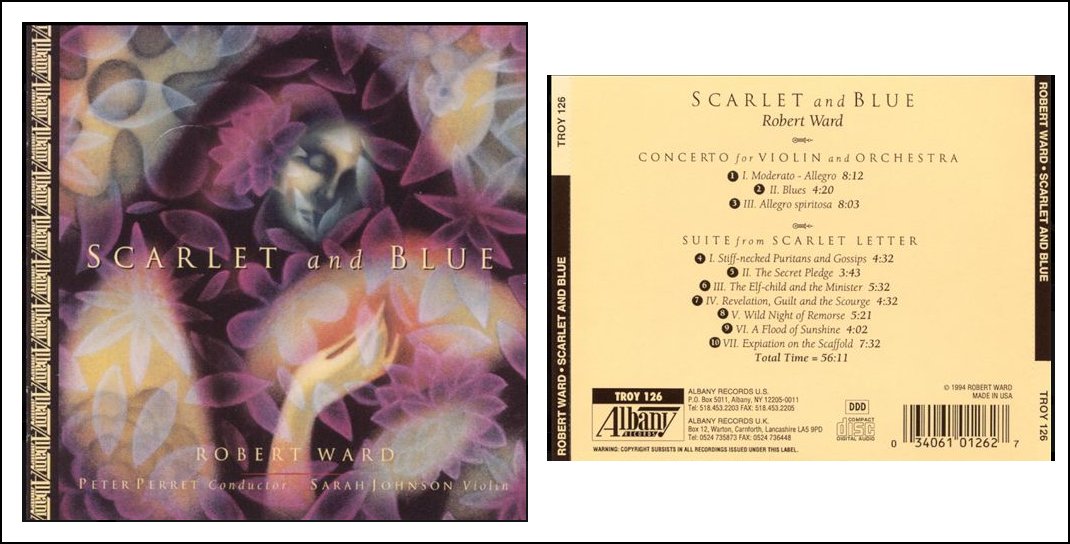
RW: Yes, it does, though I've always been amazed how
even in works which are not theater works, you can hear a sense of drama
in some composers, and others you don't. I can think of operas that
have been written by people who write fine abstract music, but they don't
have that sense of things happening up there on the stage, and the music reflects
it. Simple things like the tempo suddenly picking up that Verdi was
such a master of. It's not easy to get productions of new works if
you're unknown. A student of mine, for instance, is very interested
in doing one of the other Arthur Miller plays and Miller is interested.
He's a talented composer, but it isn't easy for him to find an opera company
that's willing to take that gamble on a new composer.
BD: So your advice for impresarios is to maybe take risks?
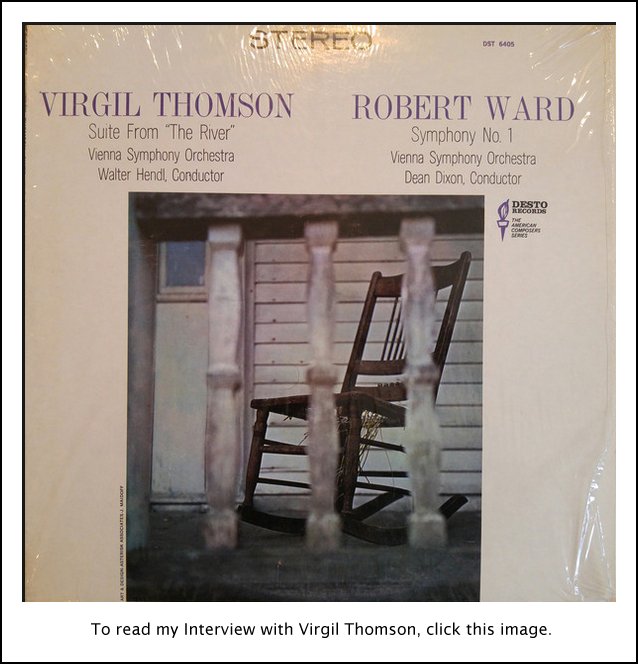 RW:
They've got to. They've got to, and I think that those risks have to
be taken in one of two ways. A company that is doing a subscription
series of even 3 but certainly 5 to 6 operas during the course of the year,
is not going to ruin their future if they do one work which isn't a great
success. They can do it without having any serious adverse consequences
for the company. The other way is the Broadway way, which is to develop
a show to such a high extent beforehand and then publicize it with 2 pages
in the New York Times. That
way you can introduce it to the public in a sufficiently large way that it
can maybe get the audience there. Once they've got it started, they
can do a run. I don't see those 2 worlds coming together very fast.
I could wish someone like Hal Prince would decide that he was going to develop
a season in New York in which he'd include both operas and Sondheim shows
and Rogers and Hammerstein shows.
RW:
They've got to. They've got to, and I think that those risks have to
be taken in one of two ways. A company that is doing a subscription
series of even 3 but certainly 5 to 6 operas during the course of the year,
is not going to ruin their future if they do one work which isn't a great
success. They can do it without having any serious adverse consequences
for the company. The other way is the Broadway way, which is to develop
a show to such a high extent beforehand and then publicize it with 2 pages
in the New York Times. That
way you can introduce it to the public in a sufficiently large way that it
can maybe get the audience there. Once they've got it started, they
can do a run. I don't see those 2 worlds coming together very fast.
I could wish someone like Hal Prince would decide that he was going to develop
a season in New York in which he'd include both operas and Sondheim shows
and Rogers and Hammerstein shows.
BD: But for that you would need different companies and more forces.
RW: That's right.
BD: In the end, is it all worth it?
RW: (laughs) It's funny that you should ask that because it relates back to a very amusing incident along the way in getting the rights on The Crucible. At some point, we had to go through Arthur Miller's agent, and like all theatrical agents, they care only about money. So they protect everything for the films and they'll do anything for a film contract because there's always big money involved. So after Arthur Miller and I had agreed that we wanted to do the work, then it had to go to his agent for contract. We were represented by a theatrically knowledgeable lawyer and they went with his agent and her lawyer and she began to insist that we have four professional companies perform this work every year, it will have to be written and produced in a year and a number of other impossible kind of things. So finally I called Arthur Miller and I said, "Arthur, we want to go ahead with this, but unless someone can get through to your agent, there's just no way." I explained to him what the problems were and then told him, for instance, that at that time, there were 4 professional major companies in the country. There was New York City Opera, the Met, the Lyric, and San Francisco. That was it. And if the Metropolitan did it, the New York City Opera would not do it. At that time, Chicago did nothing in the way of contemporary opera, new opera, American opera. And San Francisco might be a second possibility. But certainly not every year. And then I pointed out that it would be very unusual, even for a musical to be all written and produced in a year which he understood very well. So he said, "Look, I'm going to call her and tell her I want this thing negotiated and I want it done." He said, "You go to the next meeting and talk to her." So I went and not only did I answer her questions by explaining what the general situation was, and explain that I had looked up and it had taken Strauss and Puccini about 4 to 5 years to write each of their operas. I was able to give her the data. Then I told her all of these difficulties and she looked at me and she said, "Well, you know, I only have one more question. Why do you do it?" (Both laugh) Afterward I said, "Well, you know, one wants to do it, so you do it. That's it. But let me make you feel a little better about this." And I said, "Tell me. When's the last time you saw Sardou's Tosca?" She said she'd never seen it. I said, "Well, you might be interested to know that Puccini's opera is still probably grossing for its publisher two or three million dollars a year based on that play."
BD: You were finally talking her language. (Both laughing)
RW: I was talking her language. After that, we got along fine.
BD: I hope opera can be made to pay at least a little bit financially, because I know it always pays emotionally.
RW: Yes, and
it does pay the other way when the major companies take it on.
* * * * * * * *
Bruce Duffie continues his work with WNIB, Classical 97 in Chicago,
which can now be heard on the internet - get the information and downloads
you need for Streamaudio at http://www.wnib.com. A link to Bruce's
personal website can also be found there. Next time in these pages,
a chat with soprano Patricia Racette, who had a great success as Jenůfa this
season with Lyric Opera of Chicago.
- - - - - - -
= = = = = = = = = = = = =
- - - - - - -
© 2000 Bruce Duffie
This interview was recorded in Evanston, Illinois, on February 25,
2000. A copy of the unedited audio tape has been placed in the Oral History American Music Collecion
at Yale University. This transcription
was made and published in The Opera Journal
in December of that year, and was posted on this website early in 2010.
Portions (along with recordings) were used on both WNUR and Contemporary
Classical Internet Radio in 2010.
To see a full list (with links) of interviews which have been transcribed and posted on this website, click here. To read my thoughts on editing these interviews for print, as well as a few other interesting observations, click here.
Award - winning broadcaster Bruce Duffie was with WNIB, Classical 97 in Chicago from 1975 until its final moment as a classical station in February of 2001. His interviews have also appeared in various magazines and journals since 1980, and he continued his broadcast series on WNUR-FM, as well as on Contemporary Classical Internet Radio.
You are invited to visit his website for more information about his work, including selected transcripts of other interviews, plus a full list of his guests. He would also like to call your attention to the photos and information about his grandfather, who was a pioneer in the automotive field more than a century ago. You may also send him E-Mail with comments, questions and suggestions.